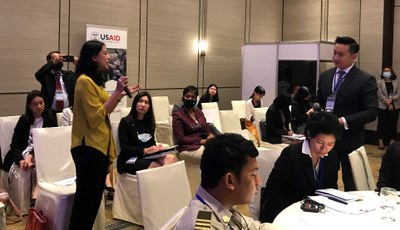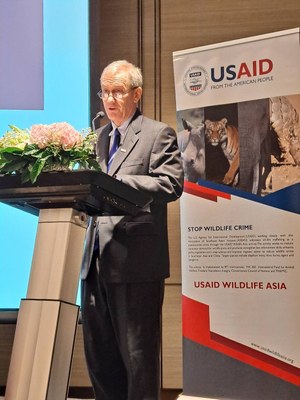Thailand’s Office of the Attorney General, USAID and WWF launch updated Rapid Reference Guide to help prosecutors build strong cases against wildlife criminals
USAID Wildlife Asia had earlier worked with Thailand’s Office of the Attorney General (OAG) to develop Thailand’s Rapid Reference Guide (RRG), which was launched in March 2019. Since then, Thailand's Wildlife Conservation and Protection Act B.E.2562 (2019) was revised and took effect in November 2019 to include stricter provisions and penalties for wildlife crimes. To subsequently update the guide, USAID Wildlife Asia, the OAG the and the WWF Thailand worked closely with Thai and U.S. authorities, including Thailand’s Department of National Parks, Wildlife and Plant Conservation; Royal Thai Police, Customs; Anti-Money Laundering Office; and Office of the National Security Council; as well as the U.S. Department of Justice, and the U.S. Fish and Wildlife Service.
USAID Regional Development Mission for Asia Mission Director Dr. Steven G. Olive opened the event alongside OAG Deputy Attorney General Dr. Chatchom Akapin commending the more than 70 law enforcement representatives attending on the impressive interagency coordination involved in developing and launching the guide. Keynote presentations were also delivered by the U.S. Department of Justice and the U.S. Fish and Wildlife Service.
USAID Regional Development Mission for Asia Director Dr. Steven G. Olive said, "The range of legislation involved in the prosecution of wildlife crimes can be difficult to navigate. With the Rapid Reference Guide, Thailand's prosecutors are now better equipped to win cases. This is a significant opportunity for Thailand to demonstrate its commitment to ending the global illegal wildlife trade". Over the past 15 years, USAID and Thailand have shared a productive partnership in the fight against wildlife crime.
While the RRG was developed primarily as a tool for prosecutors and wildlife crime investigators, it is also an important reference for the broader law enforcement community and conservation stakeholders working together to combat nature crimes and bring criminals to justice.
Due to its strategic location in Southeast Asia, Thailand has become a major transit hub for illegal wildlife products. Many shipments of rhino horn, elephant ivory and pangolin carcasses and scales have been seized in Thailand, especially at the Bangkok Suvarnabhumi International Airport. While these high-profile seizures are to be commended, prosecuting the wildlife criminals involved has been very challenging. The updated Rapid Reference Guide will help prosecutors and wildlife crime investigators work together to build stronger court cases against wildlife criminals by effectively using Thailand's key laws, including the revised Wildlife Conservation and Protection Act B.E.2562 (2019).


